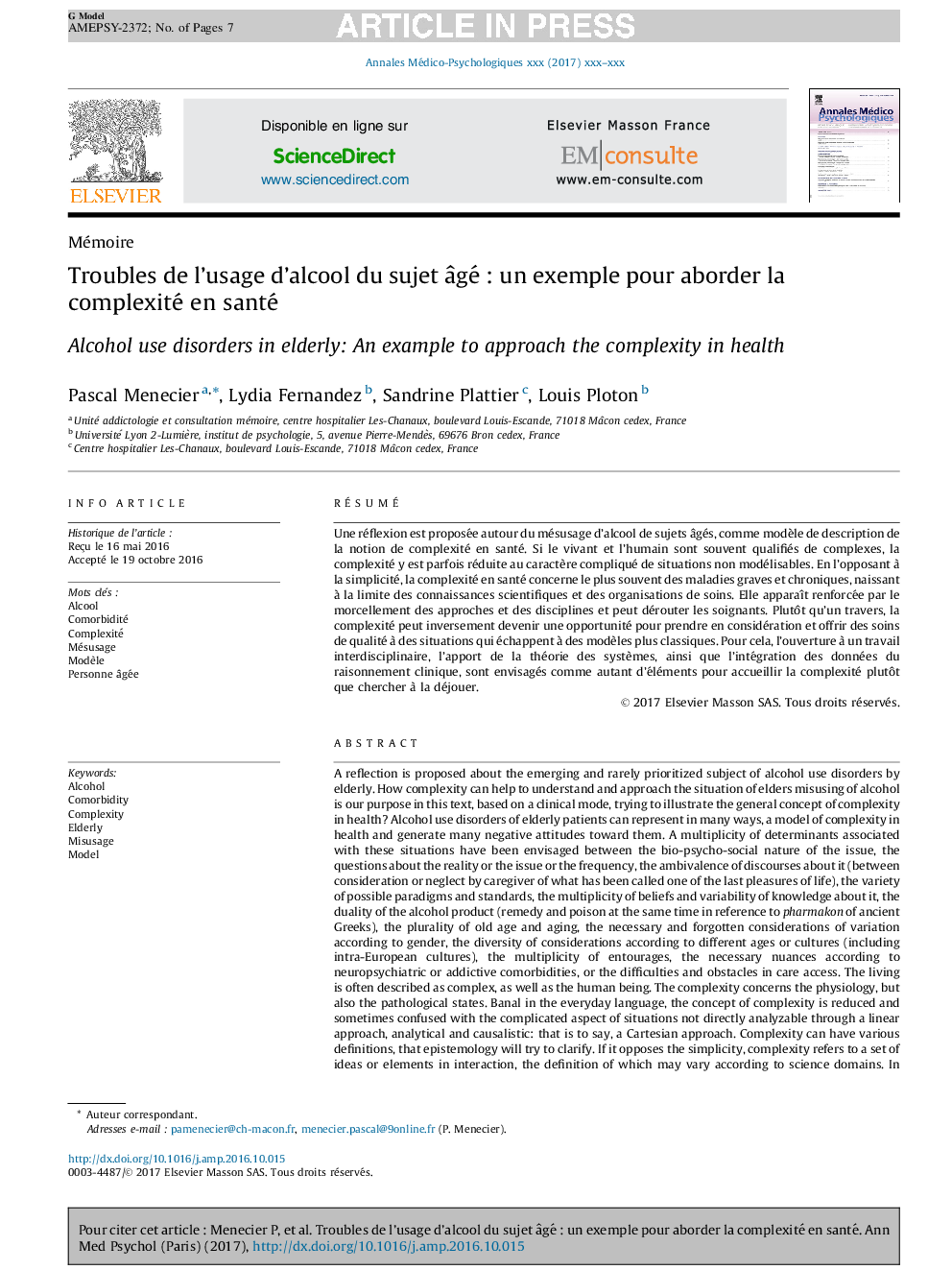| Article ID | Journal | Published Year | Pages | File Type |
|---|---|---|---|---|
| 6785527 | Annales Mdico-psychologiques, revue psychiatrique | 2017 | 7 Pages |
Abstract
A reflection is proposed about the emerging and rarely prioritized subject of alcohol use disorders by elderly. How complexity can help to understand and approach the situation of elders misusing of alcohol is our purpose in this text, based on a clinical mode, trying to illustrate the general concept of complexity in health? Alcohol use disorders of elderly patients can represent in many ways, a model of complexity in health and generate many negative attitudes toward them. A multiplicity of determinants associated with these situations have been envisaged between the bio-psycho-social nature of the issue, the questions about the reality or the issue or the frequency, the ambivalence of discourses about it (between consideration or neglect by caregiver of what has been called one of the last pleasures of life), the variety of possible paradigms and standards, the multiplicity of beliefs and variability of knowledge about it, the duality of the alcohol product (remedy and poison at the same time in reference to pharmakon of ancient Greeks), the plurality of old age and aging, the necessary and forgotten considerations of variation according to gender, the diversity of considerations according to different ages or cultures (including intra-European cultures), the multiplicity of entourages, the necessary nuances according to neuropsychiatric or addictive comorbidities, or the difficulties and obstacles in care access. The living is often described as complex, as well as the human being. The complexity concerns the physiology, but also the pathological states. Banal in the everyday language, the concept of complexity is reduced and sometimes confused with the complicated aspect of situations not directly analyzable through a linear approach, analytical and causalistic: that is to say, a Cartesian approach. Complexity can have various definitions, that epistemology will try to clarify. If it opposes the simplicity, complexity refers to a set of ideas or elements in interaction, the definition of which may vary according to science domains. In health, the complexity is rarely defined and rarely seen outside the field of Alzheimer's diseases or associated disorders. It concerns most often severe and chronic diseases emerging at the limit of scientific knowledge and care organizations. It seems to be strengthened by the fragmentation of the approaches, specialties and medical or paramedical disciplines. The complexity disconcerts caregivers, pushing them to return to the cared persons the difficulties of their professional practice, qualifying these sick persons as difficult cases or heavy patients. Confronted with the complexity in health, how to react? Should we welcome it, accept it, or seek to thwart it by fighting against. Rather than a failing, the complexity seems to us as an opportunity to consider and provide quality of care to situations, which are beyond more classical models. For this, the opening to interdisciplinary work (and not only multidisciplinary), the contribution of the theory of systems and in the particular case the contribution of systemic approaches in psychology, and data integration of clinical reasoning, are all possible resorts. Wealth and organization of complexity in health can then be considered favorably, as long as it does not crash into the complication out coming of the diversity theories or care standards that are not always miscible: that is to say when they exclude themselves mutually, feeding quarrels of schools unnecessary for cared people.
Keywords
Related Topics
Health Sciences
Medicine and Dentistry
Psychiatry and Mental Health
Authors
Pascal Menecier, Lydia Fernandez, Sandrine Plattier, Louis Ploton,
